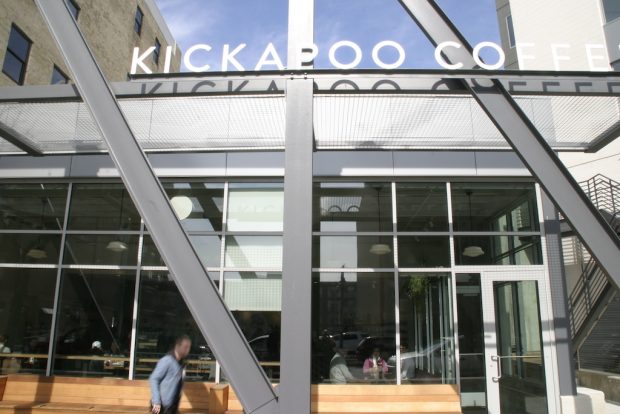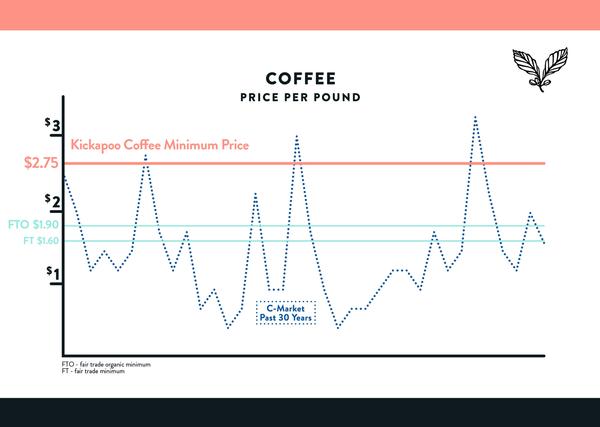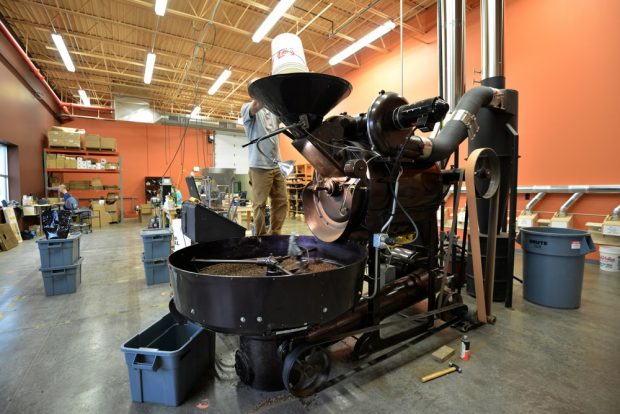
Kickapoo’s first retail bar, in Milwaukee’s Third Ward. Photo by Dave Kreisman for Daily Coffee News.
In an effort to improve sustainable farmer compensation throughout its supply chain, Viroqua, Wisc.-based Kickapoo Coffee Roasters is committing to an industry high $2.75 FOB per-pound price guarantee for all its green coffee purchases.
“Though this is currently the highest published minimum price we are aware of in the industry, it is not a revolutionary move, especially given the historical context,” the company said in an announcement of the operational effort last week. “But, we do feel this is a step in the right direction, and we are committed to taking further steps after this one.”
The aforementioned historical context relates largely to coffee prices — even high-quality specialty coffee prices — being tied to the commodity futures market, where prices fluctuate by the day based on a number of market forces. Yet when tracked over a period of decades, the price remains remarkably low and static on average, and farmers today may be receiving the same prices they were receiving 40 years ago, despite inflation and exponential increases in production costs over that same period.
“One of the ways the market has failed farmers is that over the last 40 years, the average C price has essentially remained static. Static. Meaning that the average cost for a pound of green coffee in 1975, for instance, is the same that it is today-around $1.40 FOB,” Kickapoo founders and co-owners Caleb Nicholes and TJ Semanchin wrote in the announcement. “During that same period of time, the costs of production and daily living expenses for farmers have continued to increase. When you adjust for inflation, farmers in 1975 were actually getting paid $6 or $7 a pound in today’s dollars. On the whole, farmers are making less, while spending more to produce coffee.”
Historically, private coffee companies, whether they be roasters or importers, have not been inclined to share FOB prices. Such transparency has largely been confined to third-party certifying organizations such as Fairtrade International, which offers producers a guaranteed minimum FOB price for washed arabica of $1.40 per pound, plus a $0.20 Fairtrade premium. Even that $1.60 minimum has not moved upward in years.
Some roasters, meanwhile, have striven toward greater transparency within the past four years by self-publishing the FOB prices paid for all or some of the coffees they have purchased. As the Transparent Trade Coffee project noted in late 2015, those companies have included 49th Parallel Coffee Roasters, Barismo, Bird Rock Coffee Roasters, Counter Culture and Tim Wendelboe.
Still, to our knowledge and to that of the Kickapoo team, Kickapoo’s new minimum price commitment represents the highest published commitment of its kind in the coffee sector.
Kickapoo is a longtime roaster member of Cooperative Coffees, the green coffee importer that is built around connecting roasters directly with producer cooperatives, while offering farmers assistance and compensation to better promote long-term sustainable relationships and thriving farmer communities. The company also sources through direct relationships outside the Coop Coffees network.
“We are acutely aware that price is only one component of a sustainable supply chain-community infrastructure. Climate change resilience, technical knowledge, political stability and higher yields are all woefully lacking in most coffee communities,” Nicholes and Semanchin wrote. “We remain committed to supporting efforts that address these issues wherever we can, whether by funding On The Ground‘s community development projects, through our own 5% Giving Program, by partnering with Cooperative Coffees’ Carbon, Climate and Coffee Initiative and engaging with other projects that address these issues in meaningful, successful ways.”
Nicholes and Semanchin also said they plan to revisit the minimum price commitment as time goes by, while also exploring other avenues through which to build transparent and sustainable relationships with producer groups and exporters/importers in their chain.
“We will only purchase coffee from privately owned washing stations if they are willing to open their books and show us how they are paying smallholder farmers on the farmgate level, providing us with a price breakdown back from FOB,” Nicholes and Semanchin said. “We are also committed to reviewing our minimum price and adjusting for inflation over time. Continuing to pay the same price without adjustment, year after year, means paying farmers less. We will proactively adjust our prices on a regular basis to ensure coffee production means more to the farmers we depend on.”
Nick Brown
Nick Brown is the editor of Daily Coffee News by Roast Magazine.
Comment
4 Comments
Comments are closed.








Nice move, though 2.75 is still very low. And it’s FOB, that’s what the exporter gets, not what the farmer gets. Once you discount wet milling (does the farmer take care of this?), dry milling and exporting fees..with 2.75, the farmer barely gets enough to cover costs, if that).
CounterCulture’s average FOB price in 2015 was USD 2.96/lb, when NYC was average 1.30. The Kickapoo minimum price guarantee is very good, but I agree with Rodolfo above that it’s still too low for specialty coffee, and as well as being a floor price I hope it is not also a ceiling price! What’s the minimum score that will attract USD 2.75?
Andy and Rodolfo,
Agreed that $2.75 is still too low, but this is a step towards a sustainable price. And we also need to trace back to farmgate absolutely. These are issues we will continue to address as we improve on our sourcing model. We don’t see this as an end solution. Nor is it a ceiling. Our average FOB for 2017 was well above $3.00, but for our blender bases, this $2.75 commitment definitely meant we paid more for those coffees than we would have otherwise, and this meant higher compensation for farmers. We are increasing this minimum 3% this year to account for inflation, and we are working on reporting our FOB and farm gate prices for all our coffees. Here’s to continual improvement!
– TJ Semanchin
owner, Kickapoo Coffee
Ok, so if everyone agrees to transparency go all the way though the roaster and coffee shop to the consumer. Supply, demand and quality dictates price. If you want, subscribe to pay back per pound that you purchase. I do. Stop over thinking. Think what happened to the US farmers. Over time larger farmers bought out smaller less efficient farmers at retirement age. Didn’t see any crying over corn.